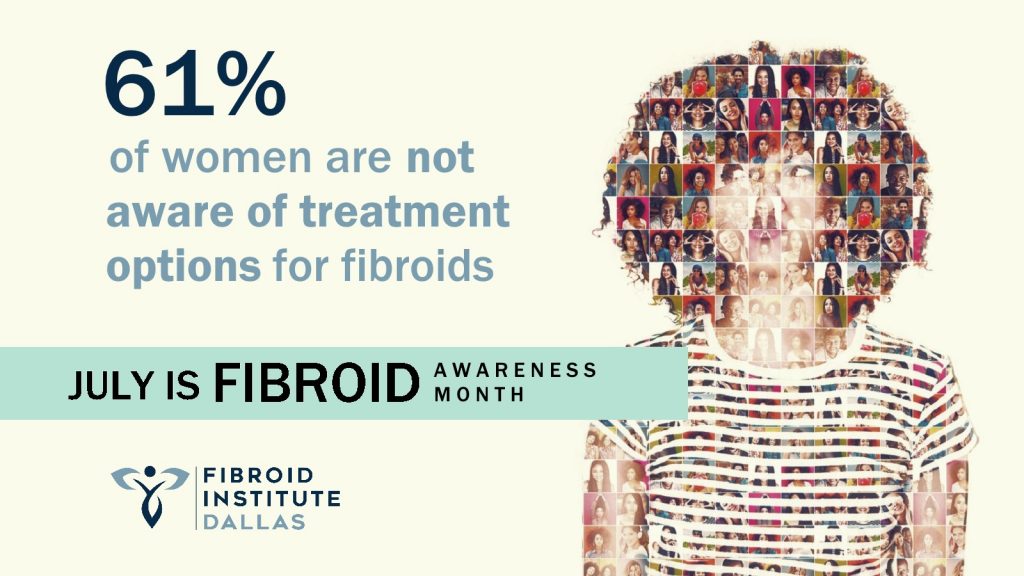July is Fibroid Awareness Month, an initiative created to draw attention to uterine fibroids, a condition that creates challenges for millions of women around the world. Fibroid Awareness Month is also intended to spur additional research and funding for this common but often under-discussed condition.
At Fibroid Institute Dallas, we agree it is important to educate women through critical awareness efforts such as this, all while being at the forefront of a non-invasive treatment option that gets fibroid patients back to enjoying life. This is one reason our founder and medical director, Dr. Suzanne Slonim, was instrumental in bringing this important topic to legislative members. State Representative Senfronia Thompson presented legislation for Texas House Bill 1966–designation of July as Uterine Fibroids Awareness Month and House Bill 1967–Improved Uterine Fibroid Education and Research. Both bills were recently passed by Governor Abbott. With the upcoming enactment of these bills on September 1st, Texas will be the 9th state to have an official designated uterine fibroids awareness month. To raise awareness of fibroids as the most prevalent and costly health issue affecting women in our own backyard here in D/FW, the Dallas City Council recently joined two U.S. Cities and nine U.S. states in declaring July Fibroid Awareness Month.
Uterine Fibroids Are a Bigger Problem Than You Think
Fibroid Awareness Month has gained steam in recent years because of organizations such as The White Dress Project, the nation’s preeminent nonprofit patient support organization for women with fibroids. The organization uses the “white dress” as an emblem of hope and strength for women who are suffering from fibroids. The “white dress” is not a fashion statement but a movement, since most women with fibroids avoid wearing white due to heavy bleeding caused by the condition. Supporters are encouraged to wear white on July 1st for Fibroid Awareness Month.
Why is this important? Fibroids, noncancerous growths of the uterus often appearing during childbearing years, affect 70-80% of all women between 35 and 54. Those numbers are even higher among Black women. 80% of Black women will develop fibroids by the time they are 50 compared to 70% of white women.
Fibroids can cause a variety of symptoms from pain, fatigue, infertility, and miscarriages. While some women don’t experience any symptoms, many do. Some of the more common life-interrupting symptoms include:
- Painful periods, including heavy or inconsistent menstrual bleeding
- Debilitating cramps, pelvic pain, and pressure
- Pain during sex
- Fatigue and weakness
- Bloating or swelling in the lower abdomen
- Back or leg pain
- Bowel or bladder dysfunction
- Constipation, diarrhea, and rectum discomfort
The Impact of Fibroid Awareness Month Is Undeniable
Research estimates that 171 million women worldwide suffer from fibroids. The lack of dialogue and misinformation that exists has only contributed to those numbers. Many women either aren’t aware they have fibroids, don’t have access to adequate information or treatment, are hesitant to report, or normalize their symptoms as part of being a woman.
“Fibroid treatment is at the intersection of healthcare equity and racial justice,” said Dr. Suzanne Slonim, the fibroid expert, speaker, and author of the book Pain-Free Periods — Banish Menstrual Misery, Fight Fibroids, and Get Your Life Back, who championed Dallas’ and Texas’ declaration of July as Fibroid Awareness Month. “Since Latina and Black women are two to three times more likely to suffer from fibroids, and fibroids cost women and their families and places of business billions in lost work time and medical procedures, addressing this women’s health issue has the potential to help women of color save billions of dollars each year.”
A growing number of states have recognized July as Fibroid Awareness Month. This includes Georgia, California, South Carolina, Florida, Maryland, Virginia, New York, Pennsylvania, and soon Texas. Washington D.C. is also on board. “In my position as the founder and medical director of Fibroid Institute Dallas, I have the opportunity to provide women with information about fibroid treatment alternatives,” says Dr. Slonim. “Uterine fibroids research and awareness programs have not received adequate funding levels. That is why I am actively involved in legislation to promote July as Uterine Fibroids Awareness Month in Texas, supporting statewide efforts to educate more women about their treatment options.”

The goal is to have Fibroid Awareness Month observed at a national level so that more women—especially those right here in the Dallas-Fort Worth area—can be supported and cared for while at the same time understanding their condition and gaining confidence from the very start.
Local fibroid specialist Dr. Suzanne Slonim wholeheartedly embraces initiatives such as Fibroid Awareness Month. She founded Fibroid Institute Dallas because she recognized that America was facing a public health crisis. Fibroids have a significant impact on the quality of life for millions of women, disrupting work and social life to the point of being debilitating.
“As someone who has the knowledge and ability to solve the problem in a less invasive manner than a hysterectomy, I decided to dedicate my practice to expanding access to and educating women about fibroid treatment alternatives,” Dr. Slonim explained in a media interview. “I am the only interventional radiologist in the region who solely focuses on treating fibroids with uterine fibroid embolization (UFE), a minimally invasive procedure to treat the condition without surgery.”
Speaking of UFE, Have You Considered It?
For years, the standard method of care for fibroids included surgical procedures such as a hysterectomy and myomectomy. In some cases, they still are the right treatment. But in today’s world of evolving technology, it is always wise to seek a second opinion and be advised on other options.

Uterine Fibroid Embolization (UFE) is a unique, low-risk procedure for fibroid treatment that avoids often complicated and bloody procedures such as a hysterectomy or myomectomy. Rather than remove fibroids, UFE uses interventional radiology and tiny particles to non-invasively block the blood flow to uterine fibroids. This causes fibroids to shrink and die, fostering a dramatic reduction in symptoms for women. Additional advantages of UFE include:
- No hospital stay
- Tiny wrist puncture, no need for vaginal access
- Short period of recovery
- Treat multiple fibroids at once
- Over 90% effective in reducing symptoms
Most women don’t realize that there are less invasive options to free them from their fibroid pain. Women who decide to undergo the UFE procedure typically get back to work and their normal activities between 7 to 10 days after the procedure, a much shorter recovery time compared to traditional surgery. In some cases where surgery is unavoidable, UFE can help prepare a patient for a hysterectomy or myomectomy and make those surgeries easier for both the patient and surgeon by reducing blood loss and improving visualization.
You Have Options for Your Fibroid Pain
Fibroid Awareness Month is here for a reason—to educate. But it doesn’t have to start and end with the month of July. Thousands of women visit Fibroid Institute Dallas year-round to find relief from their fibroids, and we are happy to cater to those needs. Uterine Fibroid Embolization (UFE) is the gold standard in non-surgical fibroid treatment. Dr. Suzanne Slonim, a leading North Texas fibroids doctor, is the founder of Fibroid Institute Dallas.
Dr. Slonim has performed over 36,000 procedures in 25+ years. A Dallas Business Journal Women in Business Award recipient, Dr. Slonim is also voted Best Doctor in D Magazine and listed in Super Doctors by Texas Monthly. The practice is highly rated 5-star by patients.
Request a free 10-15 minute phone screening to determine if you are eligible for UFE. After the screening, if you qualify for UFE, you can schedule your onsite or telehealth consultation.
State-of-the-art equipment at our Fibroid Institute Dallas North office offers availability of onsite ultrasound and MRI imaging, allowing for a much more efficient evaluation of each patient’s candidacy for UFE. A patient can have her MRI and be seen immediately afterward, even possibly get scheduled during the same visit for her UFE, depending on insurance. Most major medical insurance providers cover the cost of UFE.
At Fibroid Institute Dallas, we are dedicated to helping you become #FibroidFree. Get started now by calling 214-838-6440 or completing the form.
Fibroid Institute Dallas serves the DFW area including Garland, Mesquite, Richardson, Addison, Carrollton, Plano, Frisco, McKinney, Allen, Dallas, Duncanville, DeSoto, Cedar Hill, Lancaster, Cockrell Hill, Highland Park, University Park, Park Cities, Grand Prairie, Arlington, HEB, Fort Worth, Hutchins, Irving, and all of North Texas.
This information is not a substitute for professional medical advice. Prior to starting any new treatment or questions regarding a medical condition, always seek the advice of your doctor or other qualified health provider.

